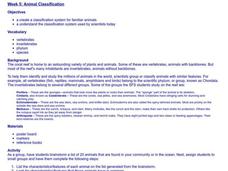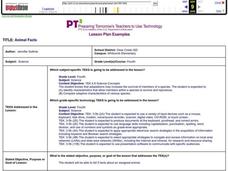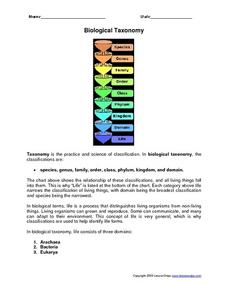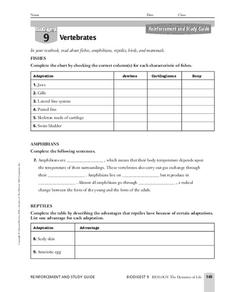Curated OER
Animals Belong in Class
In this classifying animals worksheet, students use the information in the word bank to complete the T-Chart about mammals, birds, fish, reptiles, amphibians, and arthropods. Students write 10 answers.
Curated OER
What's Your Classification
Students classify animals. In this animal groups lesson, students watch a video on animal groups and review the six animal groups. Students practice classifying animals using stuffed animals.
Curated OER
Animal Classifications
Third graders work in small groups to investigate how to sort a variety of items into groups and subgroups. They work on a class chart based on the activity which show how the items are classified based on commonalities. Upon completion...
McGraw Hill
Arthropods
Are spiders related to crabs? Study the order of arthropods with a reading selection about animal diversity. It provides details about each class within the order, as well as vivid pictures and explanatory charts.
Curated OER
Classification of Animals
Students explore animal characteristics by participating in a SMART board activity. In this animal classification lesson, students utilize a sorting chart to divide different animal names by their observable characteristics. Students...
Curated OER
Animal Classification
Students classify animals. In this animal classification lesson, students identify characteristics from each of the 5 categories of vertebrates. Students group animals by categories.
Curated OER
Animal Classification
Students list characteristics and features of animals found in their community. They then group the animals according to how they are similar and different and create names for each group. They then create a chart of their...
Curated OER
Classifying Vertebrates
Second graders study animal characteristics and classification. In this animal characteristics and classifications lesson, 2nd graders determine how to classify vertebrates which include mammals, reptiles, amphibians, birds, and fish....
Curated OER
What Kind of Animal Are You?
With the descriptions of six different animal groups (amphibians, birds, fish, insects, mammals, reptiles), students match different examples of animals to their proper groups (lizard to reptiles, girl to mammals, etc). The activity...
Curated OER
A Planet Full of Animals
Students study animals and practice classifying them through observation activities. In this animal classification lesson, students complete a KWL chart about animals. Students then sort pictures of animals into chart categories based on...
Curated OER
Classifying "Pastanimals"
Students explore biology by creating a poster presentation. In this animal classification lesson, students utilize a SMART board and practice organizing a group of animal shapes by placing them with similar animal families. Students...
Curated OER
Introduction to Classification
Fourth graders design a classification system to categorize animate and inanimate objects. They discuss the advantages of grouping things as they classify buttons, leaves, shells.
Curated OER
Animal Facts
Fourth graders list five facts about an assigned animal, and complete a bird beak activity, using pliers, blunt pencils, forceps, clothespins, and a spoon that represent different types of beaks; students complete chart showing best type...
Curated OER
Wild Horses of the Outer Banks
Students explore animal habitats. In this cross curriculum animal survival and writing lesson, students view a website about wild horses on Shackelford Island and discuss ways in which the horses have changed to this environment. ...
Curated OER
Introductory Bacteria and Virus Worksheet
Compare and contrast eukaryotes, prokaryotes, and viruses with a chart and a Venn diagram. Beginning microbiologists consider motility, reproductive ability, DNA content, and the presence of organelles. They write short answers to...
Curated OER
Classified Information - Part 1: Shapes
Third graders investigate how and why scientists use classification. They discuss classification strategies using animals, and as a class fill in a flowchart with their responses. Next, in small groups they cut out a variety of shapes...
Curated OER
Animal Classification
Second graders identify characteristics of and group animals by the five categories of vertebrates.
Curated OER
Biological Taxonomy
In this biology worksheet, students read about biological taxonomy. They then use the information they learned to answer the 13 questions on the worksheet. The answers are on the last page of the packet.
Curated OER
Creating a Classification System
Students create classification system for Arctic-dwelling animals, the Arctic hare in particular.
Curated OER
Sharks Taxonomy
Pupils, in groups, establish a classification system for the world of your classroom. They draw a chart to explain their categories and system to the rest of the class.
Curated OER
Vertebrates
In this vertebrate activity, learners review the different adaptations for the 5 groups of vertebrates: birds, mammals, reptiles, amphibians, and fishes. This activity has 12 matching, 1 fill in the blank, and 7 short answer questions.
Curated OER
Invertebrate Phyla
Students explore the invertebrate phyla. They discuss the characteristics of the invertebrate Phyla in the Kingdom Animal. Students classify organisms into Phyla based on their characteristics. They distinguish radial symmetry, bilateral...
Curated OER
Classifying Organisms within Kingdoms
Students examine animal kingdom classifications. They discuss how animals are placed into kingdom classifications and compare similarities and differences of animals within a kingdom.
Curated OER
Insect Challenge Project
In this biology instructional activity, students identify insects by their name and write it in the correct box on the sheet. Then they catch insects with nets and bring them in to identify. Students also earn points for the number of...

























